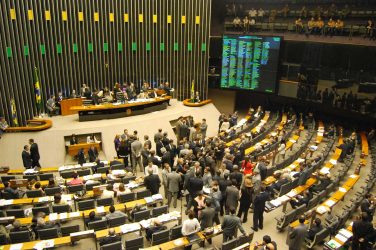Quilombos are rural Afro-Brazilian communities that originated in the 17th century with the rebellion of African slaves in Brazil. Today there are still more than 1,000 of these groups throughout the country. The government is starting to demarcate and secure ownership of the land to the people who live there now.
The National Campaign to Demarcate Quilombo lands in Brazil was officially kicked off on August 18, 2004 by the National Coordination of the Quilombo Communities (CONAQ).
The campaign is being sponsored by diverse entities who are committed to pressure for the land regulation of almost 1,100 remnant quilombo territories identified in Brazil (only 29 areas are currently demarcated).
The objective of the campaign is to enlarge and secure the land ownership of these communities so as to avoid illegal evictions and forced relocations, as well as to give access to programs and public projects for basic sanitation, family agriculture, education, culture, heath and housing. Leadership courses and activities for the communities are also part of the campaign.
In 2003, CONAQ initiated a process in the quilombos to promote human rights and to offer courses to increase knowledge regarding national and international laws that can be helpful in guaranteeing rights to the quilombo lands as well as to provide for adequate housing.
The course will also provide a forum for quilombos and urban housing movements to share experiences and information thus enlarging the social networks
Quilombos, in the Banto language, means a settlement. Quilombosare rural Afro-Brazilian communities that distinguish themselves from other sectors of the population because of their customs, traditions, culture, social and economic conditions.
These communities are ethnic territories that originated principally in the seventeenth century with the rebellion of African slaves in Brazil. They emerged in colonial Brazil as a form of organization and resistance against the institution of slavery.
Palmares, the most famous quilombo in the state of Alagoas, had a population of more than 30,000 people by 1700 and functioned like an autonomous state, resisting attacks from colonists from Holland, Luso-Brazilians, and slave hunters.
Palmares was led by Zumbi, in whose memory the Day of Negro Consciousness is celebrated on November 20th each year. Unfortunately, Palmares was completely destroyed in 1716.
The 1988 Brazilian Constitution gives the descendants of quilombo communities the right to their land and guarantees the right to the maintenance of their culture.
Since 1988, many judicial and political errors have been committed in the process of demarcation. The goal of the current campaign is to correct these errors and implement the law.
The Palmares Cultural Foundation is promoting an official registration of communities that are remnants of quilombos in Brazil. The National Institute of Colonization and Agrarian Reform (INCRA) is responsible for the demarcation of the land, which has become more and more difficult because of invasions and land conflicts by squatters and land grabbers.
The delimitation of the quilombo includes the geographic area used by the communities for social, economic, and cultural activities as well as the areas of habitation, planting, fishing, and forestry.
Once an area is demarcated and identified as a historic remnant of a quilombo, the Palmares Foundation will designate the land as Afro-Brazilian Cultural Territory, and will begin the process of registry as a national historic and artistic patrimony of Brazil.
Judicial assistance will be guaranteed to all quilombos to guard them from usurpation and land conflicts, thus protecting the territorial integrity of the land.
The identification, delimitation, demarcation and titling of quilombolands is now the responsibility of INCRA, the Minister of Agricultural Development, the Palmares Foundation, the Minister of Culture, and the Special Secretary for the Promotion of Racial Equality, the movement of communities of Quilombos, and the President of the Republic.
Adital is the Agência de Informação Frei Tito para a América Latina (Friar Tito Information Agency for Latin America). Comments may be sent to adital@adital.org.br.
Email this article
Discuss it in our Forum
Send your comments to Brazzil
Anything to say about Brazil or Brazilians? Brazzil
wishes to publish your material. See what to do.











